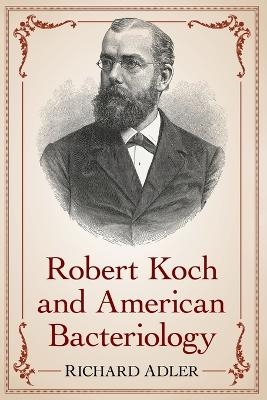
Robert Koch and American Bacteriology
Seiten
2016
McFarland & Co Inc (Verlag)
978-1-4766-6259-6 (ISBN)
McFarland & Co Inc (Verlag)
978-1-4766-6259-6 (ISBN)
During bacteriology's Golden Age (roughly 1870-1890) European physicians focused on the role of bacteria as causal agents of disease. Advances in microscopy and laboratory methodology - including the ability to isolate and identify micro-organisms - played critical roles. This book highlights those who became acknowledged leaders in the field and whose work remains influential.
During bacteriology's Golden Age (roughly 1870-1890) European physicians focused on the role of bacteria as causal agents of disease. Advances in microscopy and laboratory methodology - including the ability to isolate and identify micro-organisms - played critical roles. Robert Koch, the most well known of the European researchers for his identification of anthrax, tuberculosis and cholera, established in Germany the first teaching laboratory for training physicians in the new methods.
Bacteriology was largely absent in early U.S. medical schools. Dozens of American physicians-in-training enrolled in Koch's course in Germany and many established bacteriology courses upon their return. This book highlights those who became acknowledged leaders in the field and whose work remains influential.
During bacteriology's Golden Age (roughly 1870-1890) European physicians focused on the role of bacteria as causal agents of disease. Advances in microscopy and laboratory methodology - including the ability to isolate and identify micro-organisms - played critical roles. Robert Koch, the most well known of the European researchers for his identification of anthrax, tuberculosis and cholera, established in Germany the first teaching laboratory for training physicians in the new methods.
Bacteriology was largely absent in early U.S. medical schools. Dozens of American physicians-in-training enrolled in Koch's course in Germany and many established bacteriology courses upon their return. This book highlights those who became acknowledged leaders in the field and whose work remains influential.
Richard Adler is a professor of microbiology at the University of Michigan-Dearborn, USA. He has written five other books and numerous professional articles as well as works for the Society for American Baseball Research (SABR).
Table of Contents
Preface
Introduction
1. Robert Koch: His Life and Role in Bacteriological Research
2. Germ Theory of Disease: Origins of Bacteriology
3. Bacteriology in 19th Century United States
4. The Cartwright Lecture: Belfield vs. Formad
5. Training with Koch
6. Theophil Mitchell Prudden
7. William Henry Welch
8. Edward Oram Shakespeare
9. Harold Clarence Ernst
10. Victor Vaughan and Frederick Novy
11. Lydia Rabinowitsch-Kempner
12. American Bacteriology After Koch
Chapter Notes
Bibliography
Index
| Erscheinungsdatum | 03.11.2016 |
|---|---|
| Zusatzinfo | 33 photographs |
| Verlagsort | Jefferson, NC |
| Sprache | englisch |
| Maße | 152 x 229 mm |
| Themenwelt | Literatur ► Biografien / Erfahrungsberichte |
| Sachbuch/Ratgeber ► Gesundheit / Leben / Psychologie | |
| Sachbuch/Ratgeber ► Natur / Technik | |
| Studium ► Querschnittsbereiche ► Geschichte / Ethik der Medizin | |
| Naturwissenschaften ► Biologie ► Mikrobiologie / Immunologie | |
| ISBN-10 | 1-4766-6259-2 / 1476662592 |
| ISBN-13 | 978-1-4766-6259-6 / 9781476662596 |
| Zustand | Neuware |
| Haben Sie eine Frage zum Produkt? |
Mehr entdecken
aus dem Bereich
aus dem Bereich
Die Geschichte eines Weltzentrums der Medizin von 1710 bis zur …
Buch | Softcover (2021)
Lehmanns Media (Verlag)
17,95 €
von der Antike bis zur Gegenwart
Buch | Softcover (2024)
C.H.Beck (Verlag)
12,00 €
Krankheitslehren, Irrwege, Behandlungsformen
Buch | Softcover (2024)
C.H.Beck (Verlag)
39,95 €


